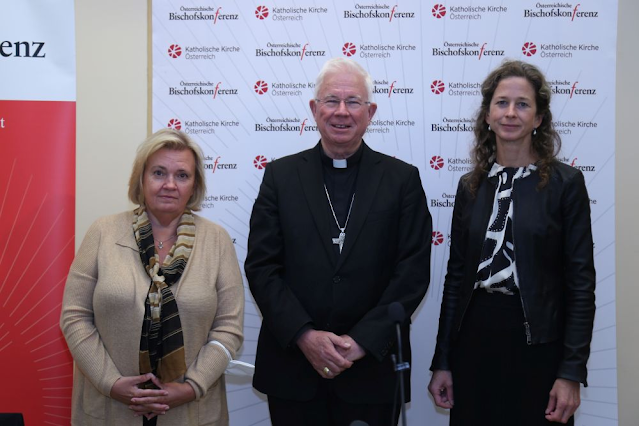Gang of three female Austrian theologians exercising undue influence in the Church. In their own name, not in the name of the Faithful.
Women theologians: Synod paper shows effort for world church consensus
Regina Polak, Petra Steinmair-Pösel and Elisabeth Rathgeb in a Kathpress interview with a first assessment of the working paper "(instrumentum laboris") for the World Synod in Rome in October.
The Working Paper (instrumentum laboris) for the World Synod in Rome in October, which was presented on Tuesday, clearly shows the effort for a world church consensus in essential future questions for the Catholic Church. This was emphasised unanimously by the theologians Regina Polak, Petra Steinmair-Pösel and Elisabeth Rathgeb. They expressed their views on the "instrumentum laboris" in a Kathpress interview on the fringes of the Bishops' Conference consultations in Mariazell. Polak and Rathgeb are members of the national synod team, Steinmair-Pösel was a member of the editorial team for the preparation of the Austrian synod synthesis paper. Polak and Steinmair-Pösel were also among the Austria delegates to the Continental Assembly in Prague.
Petra Steinmair-Pösel, Rector of the Kirchliche Pädagogische Hochschule (KPH) in Innsbruck, sees the working paper as a consistent continuation of the previous synodal process. She spoke to Kathpress of a "synchronisation of different positions". The different positions had become clear both at the European Continental Synod in Prague in February and at the world level. Each part of the universal Church has different priorities, and now it is a matter of weighing up once again in Rome which topics are essential for the Church in the 21st century. It is no coincidence that poverty, the environment and migration are given priority over other issues in the working paper. Of course, the women's issue is also important worldwide, but in many places it is probably not as central as in Western Europe.
Steinmair-Pösel admitted that she could understand the impatience in the church in many European countries. She would therefore also welcome it if the Synod would open up "pastoral trial or experimental spaces". In this way, the particular Churches could move at different speeds within a certain framework, without this immediately being seen as a contradiction. The theologian could also imagine this with regard to women's issues.
Steinmair-Pösel did not want to predict whether the World Synod would come to definite decisions in which clear positions would be laid down. She rather believes that it could lead to an "opening of pastoral leeway". This had already been the case in the Papal document "Amoris laetitia" with regard to remarried divorcees.
Different weightings at world level
For the Viennese pastoral theologian Prof. Regina Polak, the "instrumentum laboris" eludes the usual synodal logic and method of working with predetermined theses to be worked through. The themes of the seven continental synods have been transformed into questions. According to Polak, this should stimulate reflection and strengthen the synodal culture in the Church. - According to the theologian, this is a thoroughly innovative or even historical approach, but also a dangerous one. For the text will probably also reap criticism. Some people are already criticising it for not being theologically well-founded enough or for finally needing decisions rather than questions.
According to Polak, all the topics that were addressed at the European level would in any case be found in the Working Paper. In addition, there were other aspects, such as considerations about the future shape of the Papal office, which were neither a topic in Austria nor at the European level, according to Prof. Polak. The fact that topics such as poverty or migration came before Western "hot potatoes" such as the diaconate for women or compulsory celibacy probably showed different weightings at the world level.
The pastoral theologian also admitted that she could understand frustration with the text at home. Many "hot potatoes" had been discussed in this country for decades. Of course, this also has to do with the privileged situation of the Church in Western Europe; a wealthy Church in free countries. Here, theological progress could be achieved that was not possible in other countries. And this must now also be brought to the universal Church, said Polak: "This also reminds me personally to still exercise patience." Of course, decisions would have to come, at the latest at the Synod 2024.
Polak urgently warned against taking a comfortable seat on the sofa in Austria and looking to Rome. In Austria, too, the synodal process must continue and be implemented at all levels in the Church. During the consultations of the bishops in Mariazell, she had gained the strong impression that the bishops were also taking this very seriously.
Strengthening the Synodal culture
The Tyrolean Caritas Director Elisabeth Rathgeb also expects a deepened synodal process in Austria; at all levels. She found many impulses in the working paper that could and should be used not only in Rome but also in Austria.
Rathgeb admitted that she had been disappointed when reading the text for the first time that it offered hardly any clear statements on various topics, for example concerning women. This was probably due to the insight that the Synodal Process should now gain in depth and breadth through joint reflection in order to achieve a greater consensus in the world church on controversial issues. Postscript: "Probably this is the only way."
Cathcon: Synod is developing into nothing else than an authoritarian system kept going by a self-appointing pseudo-clerical lay elite.










.jpeg)

Comments